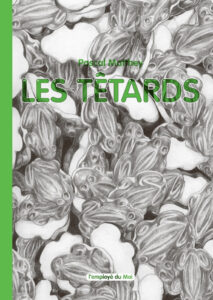
During a recent family vacation in Brussels, I snuck off to discover some of the comic book stores in the area. Admittedly, I didn’t get further than Multi-BD, a shop on one of Brussel’s main streets with an incredible assortment of French and English independent comics (including all the R. Crumb you can think of). Faced with an impossible choice, I stuck to a shelf of local flavor and picked two books by l’employé du Moi, an independent publisher I had heard about before that is based in Brussels, Belgium.
Among the two books I chose is Les Têtards, a beautiful wordless comic by Swiss-born artist Pascal Matthey. It’s a small book, about half the size of a sheet of paper, with a minimal yet elegant hardcover binding that features the title in green letters superimposed over a drawing of frog-shaped gummy bears. This type of candy, also found in kiosks on every German street corner, reminded me of my childhood and this association is not far off: Les Têtards is a drawn collection of childhood memories, presented in short wordless episodes.

What immediately struck me about the comic are its delicately shaded pencil drawings. Apart from the characters who follow a more cartoony aesthetic, everything is rendered in detail and the still life drawings and landscapes that dominate the book are beautiful to look at. The comic consists of different interwoven episodes that each center on moments of the protagonist’s childhood. These penciled snapshots of time range from the mundane to the extraordinary, there are memories of family vacations in the mountains, of falling in love for the first time, of discovering sexuality but also of marveling at a snail on the roadside. At times, the memories are bound together by a shared theme, specifically the tadpoles that give the comic its name. The child protagonist is fascinated by the metamorphoses of the tiny embryos into frogs while he himself is steadily growing, slowly shifting from childhood into adolescence.
At other times, the episodes of Les Têtards are more structured by means of association. One memory leads to the next and the single images morph into each other. While the layout of the book sticks mostly to a calm 6 panel composition, Matthey skillfully finds a rhythm to his stories by juxtaposing still images that share visual similarities, comparable to match cuts in film. In one of my favorite sequences of this type, the spawn of frogs transforms into a soccer ball and later into marbles. At their best, such sequences not only evoke the memory itself but also the act of remembering.
By taking its time, Les Têtards finds beauty in silent images and succeeds in conjuring up the intensity and wonder of childhood experience. The memories that stay with us over the years, that get carried over the tide of forgetting are significant in their own right and Matthey’s thoughtful, meditative comic honors this act of remembering.
Les Têtards Pascal Matthey 2016 l’employé du Moi (Belgium)